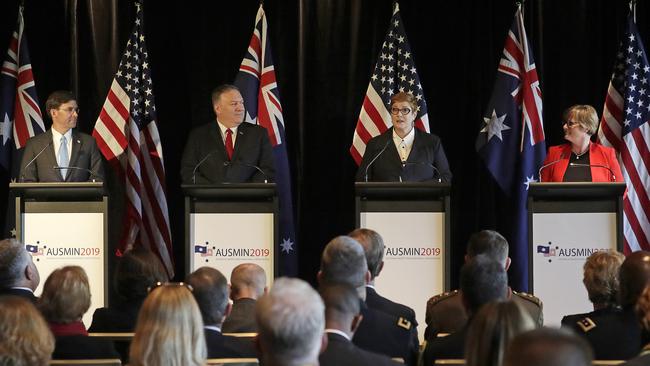
On display at the 29th AUSMIN meeting in Sydney yesterday was the reality of the working alliance — as distinct from President Donald Trump’s tweets — with a proactive ministerial and security apparatus from both nations jointly declaring the alliance is “more vital than ever”.
What emerged from AUSMIN was a deeper and more coherent US strategic response to combat China with Australia as a strong participant. The driving force was US Secretary of State Mike Pompeo, who branded the alliance “unbreakable” and bonded with Australia in calling for “an increasingly networked structure of alliances and partnership” in the Indo-Pacific, the aim being to combat China’s assertiveness.
Anybody who thinks Australia did not long ago take sides and continues to take sides on a daily basis in the US-China strategic rivalry lives in dreamland. The sheer weight of strategic infrastructure means this will not change.
Events in the past few days have been critical. The US-Japan-Australia trilateral meeting in Thailand quickly followed by the AUSMIN meeting in Sydney sent a sharper message that China’s strategic assertion must be combatted by a region-wide response that includes economic and security imperatives.
But for Australia, two tests are looming. With the justified termination by the US of its INF nuclear treaty with Russia — a decision Australia supports — the US will seek Asian locations for new missile deployments with Australia a possible choice, a potentially far-reaching decision for our relations with China.
The second, lesser test arises from the declaration by Pompeo that the US expects all nations with commercial interests in free navigation in the Straits of Hormuz to participate in intervention against Iran to protect the waters. This has been put as a general US appeal, not an alliance issue. But past experience suggests if the US assembles a broad coalition of nations then Australia will be involved.
Foreign Minister Marise Payne and Defence Minister Linda Reynolds represented Australia at AUSMIN. They made clear no decision had been taken on any Australian role in the Gulf.
Their position on the sudden possibility that Australia might become a location for US missiles in the context of rivalry with China is best summed up as: we express no appetite for this option, nor do we reject it.
The real pitch in the AUSMIN declaration is the aspiration for regional co-operation against China, arguing it constitutes a threat to the rule of law, national sovereignty, maritime security, that it seeks to create debtor-nation dependence and is more adventurous in military terms.
There was a high degree of shared vision between the Australian ministers and Pompeo along with new US Defence Secretary Mark Esper. Pompeo arrived not just with a message of assurance to Australia but with expectations of Australia.
He said this was “an era of strategic competition”, that the US had previously been “asleep at the switch” when China militarised the South China Sea and that the time had come “for the US and Australia to do much more together in the region and beyond’’.
He praised Australia’s investigations of the role of Confucius Institutes and action against foreign interference, an obvious reference to China.
Payne said the aspirations of the region could not be achieved without stronger US engagement. She said the alliance was based upon a “shared vision” for the Indo-Pacific and the growth of a “tapestry of relationships”. The AUSMIN statement put a heavy emphasis on co-operation with Japan, India, Indonesia and South East Asian states.
The ministers warned against the “potential establishment” of new military bases that could undermine stability — a pointed reference to reports that China will establish a military base in Cambodia. They offered support to Vietnam, now the target of interference by China in its exclusive economic zone.
Defence Secretary Esper said: “We firmly believe no one nation can or should dominate the Indo-Pacific. We stand firmly against a distribution pattern of aggressive behaviour, destabilising behaviour, from China. The US will not stand by idly while any one nation attempts to reshape the region to its favour at the expense of others.”
The joint declaration attacked “coercive unilateral actions” in the South China Sea that threatened to “alter the status quo and increase tensions”. With Prime Minister Scott Morrison visiting Washington in the near future for meetings with Mr Trump, the AUSMIN meeting creates the framework for the closer co-operation Australia seeks.
The AUSMIN talks highlighted what tends to be missed these days. The huge media attention devoted to Trump and his tweets obscures the extent to which ministers and officials from both sides are advancing a deeper strategic Australia-US alliance and role for the alliance in the region.




The symbol of an “unbreakable alliance” with the US pledging it is “here to stay” in the Pacific are the iconic messages coming from a rapidly deepening Australia-US security partnership openly geared to challenging China’s unceasing strategic push.